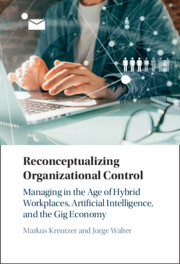 Reconceptualizing Organizational Control
Reconceptualizing Organizational Control Book contents
- Reconceptualizing Organizational Control
- Reconceptualizing Organizational Control
- Copyright page
- Contents
- Figures
- Tables
- Acknowledgments
- Part I (Re-)introducing Organizational Control
- Part II Current State of Organizational Control
- 4 An Organizational Control Framework
- Part III Quo Vadis Organizational Control?
- References
- Index
4 - An Organizational Control Framework
from Part II - Current State of Organizational Control
Published online by Cambridge University Press: 21 November 2024
- Reconceptualizing Organizational Control
- Reconceptualizing Organizational Control
- Copyright page
- Contents
- Figures
- Tables
- Acknowledgments
- Part I (Re-)introducing Organizational Control
- Part II Current State of Organizational Control
- 4 An Organizational Control Framework
- Part III Quo Vadis Organizational Control?
- References
- Index
Summary
In Chapter 4, we review the multi-disciplinary organizational control literature, synthesize its key elements, and present a comprehensive theoretical framework that includes the dimensions of organizational control, the control functions or mechanisms describing how the control dimensions influence outcomes, the control outcomes, and key contingencies. We further submit our framework to an empirical test by examining the proposed relationships with a multidisciplinary meta-analysis of 293 articles, published between 1967 and 2022, that analyzed 310 independent samples, for a total sample size of 110,585. The results of this analysis provide broad support for the key tenets of organizational control theory, including antecedents and control–outcome relationships.
The results also suggest the presence of numerous context factors and contingencies, as well as significant interaction effects between controls, including both complementary and substitution effects among controls. Together, these results attest to the powerful impact, but also the causal complexity, of organizational control.
Keywords
Information
- Type
- Chapter
- Information
- Reconceptualizing Organizational ControlManaging in the Age of Hybrid Workplaces, Artificial Intelligence, and the Gig Economy, pp. 73 - 126Publisher: Cambridge University PressPrint publication year: 2024